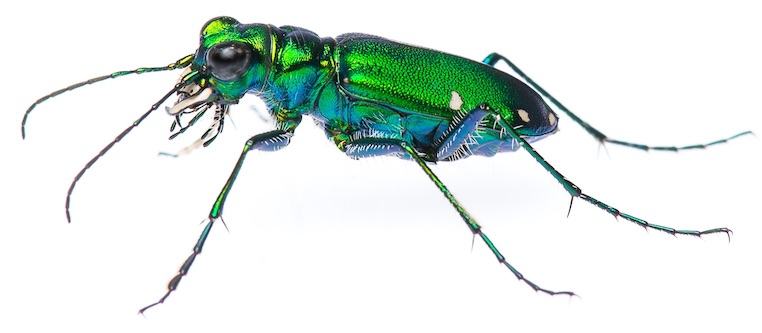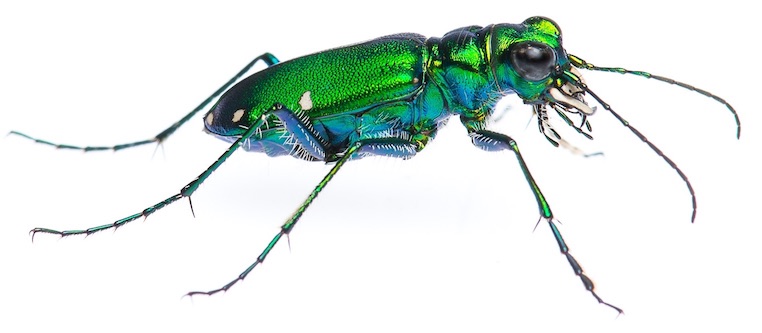Taxonomy
Family: CARABIDAE
Subfamily: CicindelinaeSubgenus: Cicindela Comments: One of 19 species in this genus that have occur in North America north of Mexico (Pearson et al., 2015); four have been recorded in North Carolina.Species Status: Four subspecies have been described, with only the nominate form occurring in most of the East, including North Carolina (Pearson et al., 2015)
Identification
Distribution in North Carolina
County Map: Clicking on a county returns the records for the species in that county.
Flight Dates: Click on graph to enlarge
Habitats and Life History
Habitats: This is an upland species that appears to prefer openings in dry forests, including trails, roads, and powerlines. Substrates used include rock outcrops or beds of decomposed granite and other rock; it also occurs on graveled roads and on clay banks (Knisley and Schultz, 1997). At least specimen, however, was collected far from any form of mineral soil: along a dirt road running through the middle of a peatland. Diet: Predacious, presumably feeding on a wide variety of small insects and other arthropodsObservation Methods: As in most other Tiger Beetles, this species diurnal and active, with its dark coloration making it fairly conspicuous. However, it often localized and occurs at relatively low densities, factors that make its occurrences somewhat unpredictable.Abundance/Frequency: Adult Phenology:
Status in North Carolina
Natural Heritage Program Status: Natural Heritage Program Ranks: G5T5 [S4S5] State Protection: As with other North Carolina insects, no state laws provide them any protection. Permits must be obtained, however, to collect them in State Parks and other nature preservesComments: This species occurs fairly widely over at least the Piedmont and lower Mountains. Although somewhat specialized in terms of habitats, it does not appear to be strongly habitat-limited. Consequently, it appears to be secure, if somewhat uncommon, within North Carolina.
Photo Gallery for Cicindelidia rufiventris - Eastern Red-Bellied Tiger Beetle Recorded by: Samuel Schoenberg Recorded by: Samuel Schoenberg Recorded by: Mark Shields Recorded by: Rob Van Epps Recorded by: John Amoroso Recorded by: Kyle Kittelberger Recorded by: Kyle Kittelberger Recorded by: Steve Hall Recorded by: E. Corey Recorded by: B. Anderson Recorded by: Steve Hall Recorded by: Steve Hall

 »
»
 »
»